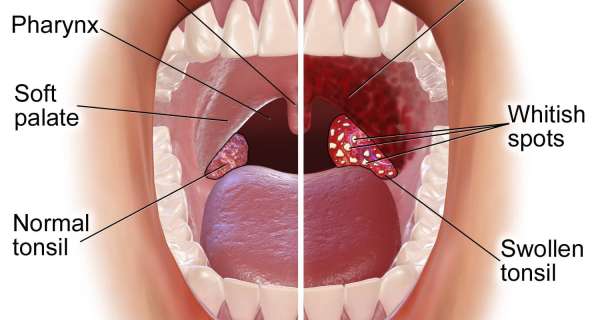Tonsillitis is the inflammation of the tonsils. Tonsillitis can result from a bacterial or viral infection causing a sore throat, fever, swollen glands around the neck, and trouble swallowing. While Tonsil stones occur when there is a buildup of bacteria and debris within and around the tonsils. This debris becomes calcified (hardened) and looks like a stone-like growth, giving it the name “tonsil stones”.
Simply put, tonsillitis is the inflammation of the tonsils while tonsil stones generally don’t result in inflamed tonsils.
The tonsils are the two masses of lymphatic tissue in the mouth.
Tonsil stones do not have larger complications of health, though the tonsil stones can grow bigger, and so does the unpleasant odour.
Most of the time, you don’t even know you have tonsil stones until you cough them out in an “energetic cough”, but if it’s tonsillitis, the inflamed tonsils won’t let you rest.
Tonsillitis can result, particularly due to streptococcal infection, and if not properly treated, It can result in rheumatic fever (inflammation of the joints, heart, and blood vessels) or even nephritis (inflammation of the kidney).
Treatment of tonsillitis ranges from home care remedies to surgical removal, depending on the cause.
Home care remedies like:
•Using salt water as gargles
can be useful in the treatment of tonsillitis.
If it doesn’t, help consult your healthcare provider for medications to handle the tonsillitis which usually includes antibiotics depending on the cause of the tonsillitis.
When you have recurrent or frequent tonsillitis another way is the surgical method known as “tonsillectomy”. Tonsillectomy involves the surgical removal of the tonsils.
The following are risk factors for tonsil stones:
-Poor oral and dental hygiene
-Large tonsils (some people have larger tonsils than others, this predisposes their tonsils to storing up debris that will lead to bacterial overgrowth with resultant tonsil stones).
-Chronic sinusitis (the inflammation of the sinus, which is the space inside your nose and head).
-Chronic tonsillitis can also give rise to tonsil stones.
Symptoms of tonsil stones include:
-Bad breath
-Sore throat
-Ear pain (especially when there are sinus issues)
-white or yellow debris on the tonsils.
Just like tonsillitis, the remedies for tonsil stones range from home remedies to surgical means.
The following can help remedy tonsil stones
-Practice good oral hygiene
-Stop smoking
-You can gargle vigorously, making use of salt water
-Coughing with full force can be of help too, as it will help loosen the tonsil stones.
-Antibiotics can be of help, in slowing the growth of the bacteria. (Always consult your health care provider for the medication you use).
See a medical practitioner to remove the tonsil stones, Removal is not advised, however, if you still want to do it yourself, use soft things like cotton buds, using hard things like toothbrushes to remove tonsil stones will only injure your tonsils which are delicate and might create room for other infections.
With persistent tonsil stones, you might need a medical procedure, which involves the removal of the tonsils.
Always consult your healthcare provider before starting or stopping any medication(s).
To prevent tonsillitis and/or tonsil stones
1. Practice good oral hygiene.
2. Don’t share a toothbrush.
3. Change your toothbrush at least every three months.
4. Stop smoking/don’t smoke.
5. Cut out sugary fruits, added sugar, sugary drinks, packaged fruit juice, and soda. Sugar is a wonderful growth medium for bacteria; removing sugar from your diet greatly reduces your risk of tonsil stones or tonsillitis. This is one of the greatest hacks.
6. Don’t use mouthwash.
7. Gargle with salt water.
8. Eat healthy. Eat hard-boiled eggs. Eat cooked food, cooked proteins, and cooked meat. Doing this will provide your body and teeth with the nutrients they need, which in turn will give you healthier teeth, a healthier immune system, and a healthier body.
9. Always drink loads of water and stay hydrated.












0 Comments